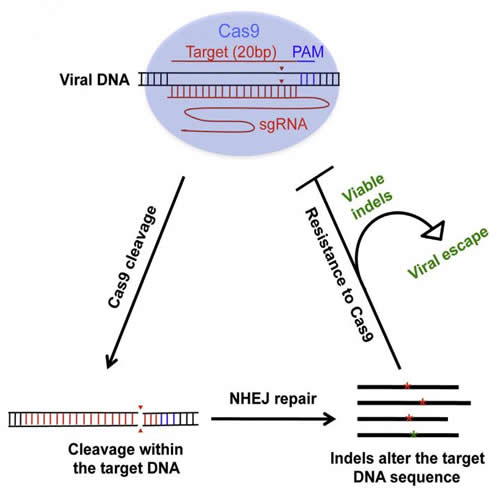HIV can develop resistance to CRISPR/Cas9

Caption:
This visual abstract depics how HIV-1 can escape Cas9/sgRNA-mediated inhibition. The researchers reveal that the NHEJ repair machinery generates mutations in the HIV-1 Cas9 cleavage site that result in two outcomes: viral replication suppression and viral escape.
Credit: Wang et al./Cell Reports 2016
Cell Press
7-Apr-2016 - The CRISPR/Cas9 gene-editing platform may need a little bit more tweaking before it can be used as an effective antiviral, reports a study published April 7 in Cell Reports . Researchers who used CRISPR/Cas9 to mutate HIV-1 within cellular DNA found that while single mutations can inhibit viral replication, some also led to unexpected resistance. The researchers believe targeting multiple viral DNA regions may be necessary for the potential antiviral aspect of CRISPR/Cas9 to be effective.
Upon entry into a cell, HIV's RNA genome is converted into DNA and becomes entwined with the cellular DNA. From here, CRISPR/Cas9 can be programmed to target a DNA sequence and cleave viral DNA. The problem is that HIV is notoriously good at surviving and thriving with new mutations, so while many viruses are killed by the targeted approach, those that escape the CRISPR/Cas9 treatment become more difficult to target.
"When we sequence the viral RNA of escaped HIV, the surprise is that the majority of the mutations that the virus has are nicely aligned at the site where Cas9 cleaves the DNA, which immediately indicates that these mutations, instead of resulting from the errors of viral reverse transcriptase, are rather introduced by the cellular non-homologous end joining machinery when repairing the broken DNA," says senior study author Chen Liang, Senior Investigator at the Lady Davis Institute at the Jewish General Hospital and the Associate Professor of Medicine at the McGill University AIDS Centre.
"Some mutations are tiny--only a single nucleotide--but the mutation changes the sequence so Cas9 cannot recognize it anymore. Such mutations do no harm to the virus, so these resistant viruses can still replicate, he says"
The study, a collaborative effort between researchers at McGill University and the University of Montreal in Canada and the Chinese Academy of Medical Sciences and Peking Union Medical College in China serves as a cautionary tale for those who hope to apply CRISPR/Cas9 as an antiviral. Liang doesn't believe the effort is futile, however, as there are strategies that could overcome this limitation. For example, targeting multiple sites with CRISPR/Cas9 or using other enzymes aside from Cas9. Once a solution is identified, the next barrier will be identifying ways to deliver the treatment to patients.
"CRISPR/Cas9 gives a new hope toward finding a cure, not just for HIV-1, but for many other viruses," Liang says. "We have a long road toward the goal, and there may be many barriers and limitations that we need to overcome, but we're confident that we will find success."
###
This work was supported by the Canadian Institutes of Health Research to CL, the Ministry of Science and Technology of China, and the Nature Science Foundation of China.
Cell Reports , Wang et al.: "CRISPR/Cas9-derived mutations both inhibit HIV-1 replication and accelerate viral escape" http://dx. doi. org/ 10. 1016/ j. celrep. 2016. 03. 042
Cell Reports ( @CellReports ), published by Cell Press, is a weekly open-access journal that publishes high-quality papers across the entire life sciences spectrum. The journal features reports, articles, and resources that provide new biological insights, are thought-provoking, and/or are examples of cutting-edge research. Learn more: http://www. cell. com/ cell-reports. To receive Cell Press media alerts, contact press@cell.com.
Media Contact
Joseph Caputo
jcaputo@cell.com
617-397-2802
@CellPressNews
http://www. cellpress. com
Source:http://www.eurekalert.org/pub_releases/2016-04/cp-hcd033116.php
For more HIV and AIDS News visit...
Positively Positive - Living with HIV/AIDS:
HIV/AIDS News |